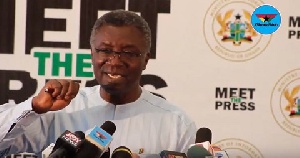Professor Kwabena Frimpong-Boateng, the Minister of Environment, Science, Technology and Innovation, has called for a stronger collaboration between stakeholders in Africa to promote sustainable and inclusive development.
He said African scientists needed to come up with innovations that could make the people own and control technology, skills and resources to enable the Continent to own her resources and benefit from them.
“Everything we do should put us in a position to meet our basic necessities of life. These are food, shelter, clothing, health and security. Any population that is not able to feed itself, cloth itself, shelter itself and defend itself has little chance of long term survival,” he said.
Prof. Frimpong-Boateng was speaking at the opening of the 16th Global Network for the Economics of Learning, Innovation, and Competence Building Systems (GLOBELICS) in Accra on Wednesday, a three-day conference being attended by more than 300 delegates.
He said for Africa to thrive, it needed to build institutions that would allow the people to meet their basic needs as well as emerging and future challenges such as those related to climate change.
He said there was also the need to embrace technology in all its forms because technology had a track record of solving problems.
“We believe that our development depends on our ability to understand, interpret, select, adopt, use, transmit, produce and commercialise scientific and technological knowledge,” he said.
Prof. Frimpong-Boateng said Africa had to develop the capacity to build machines and installations needed for the development of the Continent.
Installations that would work in industry, agriculture, energy production, transportation, sanitation, water and natural resource management, health, and human settlements among other things must be developed.
“Our success as a Continent will be determined by what we can do to what we have,” he said.
In Ghana, the research institutes had developed products such as: community-based eco-toilets for the production of gas; solar-powered pump stations for agriculture operations; new food crop seed varieties and new processing technologies to enhance productivity and sustain rural livelihood.
Prof. Frimpong-Boateng said the Ministry had revised the National Science and Technology Policy, created a Presidential Advisory Committee for Science Technology and Innovation (STI) and an STI Fund, as well as formulated National Plastics Management and Biodiversity Policies.
The Minister said these interventions and many others had contributed to the advancement of innovation and development in Ghana, but more action in terms of research and practice was still required.
Professor Victor Kwame Agyeman, Director General of the Council for Scientific and Industrial Research (CSIR) urged fellow scientists to come out with innovations that would justify the course of governments to putting more funding toward research.
The Science and Technology Policy Research Institute (STEPRI) of the Council for Scientific and Industrial Research (CSIR) is the host institution of conference on the theme: “Innovation, Economic Growth and Sustainable Development: Strengthening Institutions for Greater Relevance, Effectiveness and Inclusivity’’.
It is expected that the conference would contribute to achieving Government’s flagship projects aimed at creating jobs and transforming the economy.
The success of the conference would also enhance CSIR-STEPRI’s image as an international think-tank in Science and STI Policy.
GLOBELICS is an open diverse community of scholars working on innovation and competence building for economic development.
Since 2003, GLOBELICS International Conference has brought together over 3,000 world leading scholars to contribute to socio-economic, sustainable and inclusive development.
General News of Thursday, 25 October 2018
Source: ghananewsagency.org

















